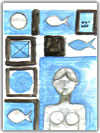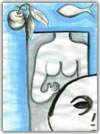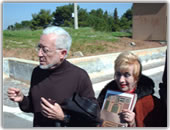|
|
|
| Leggilo
nella tua lingua!! |
|
Ignazio
Apolloni, an author, poet, political commentator, and editor and
chief contributor to Intergruppo Singlossie, his own contemporary
journal, is fortunate as well, but he questions himself, his island
country, and its relations with Italy, which he calls with mischief “the
mother country”.
“You must understand that there are many Sicilys”, he says. We
are in his Palermo apartment, every wall of which is painted – a section
of Picasso’s “Guernica” reproduced on one wall, cartoons
and political caricatures in the foyer, abstracts and seashells mural of jeans
hanging from a washline painted on his bedroom wall. “We are Greek. We
are influenced by the Normans, the Arabs, and the Spanish Bourbons. We have
the fatalism of the Arabs, the pride of the Normans, the courtesy of the Spaniards.
It is what we feel. It is difficult to describe the Sicilian soul. Are we Sicilian?
Italian?
“Let me tell you tha many of us feel Italian these days, but that is
because for centuries the national government forgot us. They felt we were
inferior and they behaved as if we were. The north was industrial, the south
agricultural and forgotten.
“After 1945 that changed. The contadini, the peasants, organized.
The socialists and communists organized. Lands were occupied. Landlords were
thrown out. Then the government recognized there was a problem in the south,
and in the 1960s lot of money came here. We then knew we had a government.
We became Italian. We received autostradas, port expansions, unemployment compensation,
health care, school funds”.
This thin and elegant man, with a gray beard and close-cropped gray
hair, is a cynic who loves his country and its earth. We talk at an
open-air food counter in Palermo, eating panelle, deep-fried
fritters or mashed chick-peas, fresh parsley, and flour. Apolloni smiles
as he says that he was away from his country too long. He was born
in Palermo but lived in Rome, Turin and Reggio Calabria before going
to New York and then to California, where he taught Italian literature
at UCLA for almost three years. “Then I had to come back”.
In addition to his literary talents, he is a lawyer, has been a union
organizer, a politician, and, he says, “a Sicilian, but when
I see vandals, see people in government who do not care about others,
then I am furious and not so proud”.
These are the concerns you are not aware of as you travel about the
triangular island, for Sicily is beautiful to see, wonderful to touch,
delicious to taste. Its sensuality captures you. But when you have
spoken about Sicily to Sicilians, your perceptions sharpen and the
land becomes fuller.
Fred Ferretti Taken from A Slice of Sicily, appeared
on European Travel & Life, June 1987, pages 136-137. |
|
È nato a Palermo
dove è ritornato dopo una lunga permanenza a Torino, Roma,
New York, Los Angeles. Poeta narratore, scrittore di favole e fiabe,
Ignazio Apolloni è uno dei più raffinati operatori
singlottici. Direttore di riviste, organizzatore culturale, esperto
di linguaggi multimediali, spazia dal racconto al mito, dall'arte
alla storia, dal moderno al postmoderno. Dotato di un sottile umorismo,
sembra irridere alle bassezze del vulgus, mentre invece ne fa un
continuo motivo di riflessione, alla moda di Jonesco o di Beckett.
Memore di Berkeley, e sulla scia del ’68, ha fondato assieme
ad alcuni altri arrabbiati il movimento politico-letterario denominato
Antigruppo. Esauritasi questa fase ha dato vita, unitamente
a Rossana
Apicella, ad una feroce contestazione della poesia visiva
in nome del lettering e della singlossia producendo opere di tale genere
come: “Lavoro
poetico su una locuzione avverbiale”, “Schetch
poesie”, “Poesie
impossibili”, “Tra il dire e il mare c’è di
mezzo la poesia”, raggruppate poi nel volume “Singlossie” edito
nel 1997. Dall’Avanguardia alla sperimentazione, questo il percorso
ideativo di Ignazio Apolloni. Lettore di messaggi subliminali e lui
stesso produttore di simili strumenti di persuasione occulta, gioca
con le parole e il linguaggio poetico come un bimbo cui sia stato messo
in mano il pongo. Inventore della Singlossia, oppositore
del non-sense pretende di dare un senso all’io. Usa la grafia,
il lettering e il disegno in quanto crede più nel bianco e nero
che nel colore. Ama infatti il tutto tondo, i primi esperimenti cinematografici,
i disegnatori fiamminghi del Seicento, dei quali però rifiuta
sia l’apocalisse sia il trionfo della morte. Sul piano squisitamente
narrativo ha pubblicato “Niusia” (1976), “Favole
per adulti” (1981, prefazione di Fabrizio Roversi), “Roma
1956” (1998), “Capellino” (1991, prefazione
di Stefano Lanuzza), “Gilberte” (1995), “Racconti
patafisici e pantagruelici” (Manni 2000); “Dalla
parte del mare” (Manni
2001, prefazione di Marcello Benfante),“New
York allucinogeni e merletti” (Manni 2003, prefazione
di Salvatore Ferlita), “Il
golfino celeste a maglie larghe” (Coppola 2005,
prefazione di Anna Maria Ruta), “L’amour
ne passe pas” (Coppola
2005, prefazione di Marcella Croce), “Marrakech” (Manni
2006), “Favolette” (Besa 2007,
prefazione di Michele Rak),“Lettres
d’amour à moi même” (Coppola
2007, prefazione di Antonio Grado), “L’America
vista dalla stratosfera” (Coppola
2007). La sua vivacità lo porta
a spaziare in altri ambiti e ad essere presente
anche nel campo dei libri di artista. |
|
|
|
|
|





